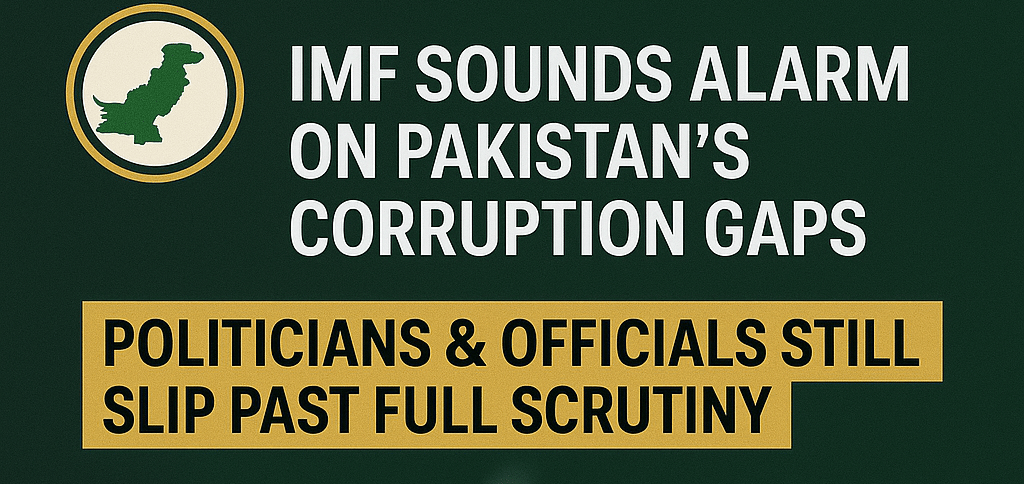IMF Sounds Alarm on Pakistan’s Corruption Gaps
The IMF’s draft governance report: IMF sounds alarm on gaps in Pakistan’s politically exposed person (PEP) detection system, urging adoption of global anti-corruption best practices.
NATIONALBUSINESS
Admin
8/12/20252 min read


ISLAMABAD – The International Monetary Fund (IMF) has highlighted significant shortcomings in Pakistan’s ability to identify and monitor politically exposed persons (PEPs), citing an absence of corruption-specific warning indicators that could expose misuse of public office.
These findings come from the IMF’s Governance and Corruption Diagnostic Assessment, shared with Islamabad for review before its final release, expected by the end of this month.
Uneven Identification Across Sectors
According to the draft report, PEP identification in Pakistan remains inconsistent. Smaller financial institutions lack automated screening tools, comprehensive databases, and targeted red-flag indicators—making it harder to detect suspicious activity linked to corruption.
The IMF has urged Pakistan to adopt global best practices, especially for detecting irregularities in government contracts and high-risk transactions. This recommendation is part of a broader reform commitment made by Islamabad under a $7 billion IMF programme signed in September last year.
Who Are Politically Exposed Persons (PEPs)?
PEPs include:
Heads of state and government
Senior politicians and bureaucrats
Judges and military officials
Executives of state-owned enterprises
Ambassadors and members of parliament
Because PEPs are at higher risk of being involved in corruption or money laundering, banks and financial institutions apply enhanced due diligence (EDD) before opening accounts or processing transactions. This involves:
Senior management approval
Verification of wealth sources
Ongoing monitoring of accounts
However, the IMF noted that smaller institutions often fail to apply these safeguards effectively, relying solely on regulator-provided lists without developing internal monitoring systems.
Lack of Corruption-Specific Typologies
The IMF found that reporting institutions often lack detailed corruption-related typologies—common transaction patterns that signal potential misuse of funds.
While the State Bank of Pakistan (SBP), Securities and Exchange Commission of Pakistan (SECP), and Federal Board of Revenue (FBR) have issued guidelines, these are considered too general and fail to cover real-world laundering tactics.
To bridge this gap, the FBR introduced an online screening platform for checking clients against lists of senior government officials and parliamentarians.
Lessons from Global Anti-Corruption Models
The IMF recommends Pakistan look to Canada and Colombia for guidance:
Canada publishes red-flag indicators for procurement fraud, rapid contract turnovers, and unexplained wealth among public officials.
Colombia has developed sector-specific indicators to detect irregularities in healthcare contracts, construction-linked laundering, and regional fund transfers during the COVID-19 pandemic.
Implementing similar systems in Pakistan could strengthen PEP detection and curb misuse of public resources.
Government Response and Possible Delays
The Ministry of Finance has instructed relevant departments to respond to the IMF’s recommendations. Some agencies have agreed with the findings, while others have pushed for revisions.
Given the complexity of reviewing each recommendation, there is a possibility the report’s publication could be delayed beyond the end of August.
Explore
Your lens into Pakistan's vibrant stories.
Connect
Discover
+92-300-0440097
© 2025. All rights reserved.
